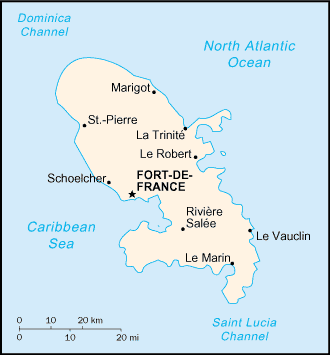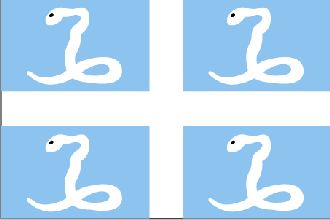
|
Martinique
Background:
Colonized by France in 1635, the island has subsequently remained a French
possession except for three brief periods of foreign occupation.
Location:
Location: Caribbean, island between the Caribbean Sea and North Atlantic Ocean,
north of Trinidad and Tobago.
Area: Total: 1,100 sq km, water: 40 sq km, land: 1,060 sq km.
Area - comparative: Slightly more than six times the size of Washington, DC.
Coastline: 350 km.
Climate and Terrain:
Climate: Tropical; moderated by trade winds; rainy season (June to October);
vulnerable to devastating cyclones (hurricanes) every eight years on average;
average temperature 17.3 degrees C; humid.
Terrain: Mountainous with indented coastline; dormant volcano.
Natural resources: Coastal scenery and beaches, cultivable land.
Geography - note: the island is dominated by Mount Pelee, which on 8 May 1902
erupted and completely destroyed the city of Saint Pierre, killing 30,000
inhabitants.
People:
Population: 425,966 .
Ethnic groups: African and African-white-Indian mixture 90%, white 5%, East
Indian, Chinese less than 5%.
Religions: Roman Catholic 85%, Protestant 10.5%, Muslim 0.5%, Hindu 0.5%, other
3.5%.
Languages: French, Creole patois.
Government:
Dependency status: Overseas department of France.
Capital: Fort-de-France.
Economy overview:
The economy is based on sugarcane, bananas, tourism, and light industry.
Agriculture accounts for about 6% of GDP and the small industrial sector for
11%. Sugar production has declined, with most of the sugarcane now used for the
production of rum. Banana exports are increasing, going mostly to France. The
bulk of meat, vegetable, and grain requirements must be imported, contributing
to a chronic trade deficit that requires large annual transfers of aid from
France. Tourism, which employs more than 11,000 people, has become more
important than agricultural exports as a source of foreign exchange.
Statistics:
Telephones - main lines in use: 170,000.
Telephones - mobile cellular: 15,000.
Radio broadcast stations: AM 0, FM 14.
Radios: 82,000.
Television broadcast stations: 11 (plus nine repeaters).
Televisions: 66,000.
Internet users: 5,000.
Railways: 0 km.
Highways: Total: 2,105 km.
Airports - with paved runways: 1,
with unpaved runways: 1.
Return to Visiting Locations
|



